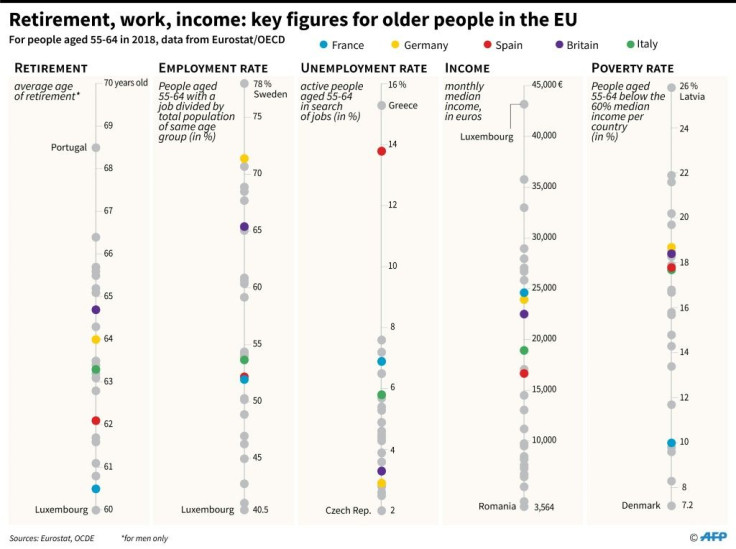France's Pension Reform: What's On The Table?

The French government has been locked in a weeks-long standoff with unions over plans to sweep away myriad pension schemes in favour of a universal system.
The move was a key campaign pledge from Emmanuel Macron, who has staked his presidency on a wide-ranging reform aimed at bolstering growth and cutting deficits.
As officials renew talks with union leaders on Tuesday, here's a look at what the reform entails, and who would be affected by the changes.
France currently has a defined benefit system in which people are guaranteed monthly payouts upon retirement based on their contributions.
For salaried employees, who represent roughly two-thirds of the working population, pensions are calculated from the average of their 25 best years of earnings.
Officially people can retire at 62, but previous reforms have increased the number of quarters required for a full pension, meaning most people end up working beyond that age.
In the public sector, however, pensions are calculated more favourably by taking into account only the last six months of earnings, and civil servants are often allowed to retire much earlier.
Train drivers, for example, can stop working at 52, and police officers, military personnel, energy sector workers and others also benefit from "special regimes" allowing early retirement.
Pharmacists, lawyers, physiotherapists, dockers and even Paris Opera workers also have separate systems offering specific benefits, resulting in 42 different regimes.
Overall it is one of the most generous systems in the world, with pensions representing on average 75 percent of workers' pre-retirement earnings, compared to an OECD average of 58 percent.
It is also one of the most expensive, with public spending on pensions representing 14 percent of GDP -- only Greece and Italy spend a higher proportion in Europe.
Macron's reform would create a single system based on points that would be accrued based on salary, so that "for each euro contributed, everyone gets the same pension rights".

The value of a point could change, but the government says unions will have their say on any changes, which would have to be approved by parliament.
The government says points are fairer to part-time workers and note the system is already used in Germany as well as for France's obligatory supplementary pension regime for high earners.
The government has already pledged that arduous or dangerous jobs will be taken into account, with police, pilots, hospital workers and others still qualifying for early retirement.
The reform would also boost the minimum pension to 1,000 euros ($1,110) -- a welcome increase for farmers and other low earners -- while offering bonuses to parents as well as women who stop working to look after children.
People who earn more than 120,000 euros would have their contribution rates increase from this level, but without any increase in the number of allocated points.
France's largest union, the CFDT, backs the outline plan, but the hardline CGT and Force Ouvriere unions say workers won't have any clear idea of how much they will get when they retire.
The official retirement age will remain 62, but the government wants to introduce a "pivot age" of 64 that would open the door to a full pension.
People who retire before then would have to accept lower monthly payouts, while those who work beyond would see their pensions increase.
Macron says the move is necessary as people start working later and living longer, otherwise there will be too few working people to support the bulk of retirees under the pay-as-you-go system.
The current system is forecast to have a deficit of up to 17 billion euros ($19 billion) if nothing is done, according to the government's Pensions Advisory Council.
But unions, including the CFDT, say the pivot age would effectively force millions of people in both the public and private sectors to retire later.
All the changes would apply only to people born in 1975 or later, and be introduced gradually -- the current systems would still apply for years worked before 2025.
Only people born starting in 2004 will be fully covered by the new system.
The government aims to finalise the new plan by January 22 so it can be presented to parliament for a vote this spring.
© Copyright AFP 2024. All rights reserved.




















